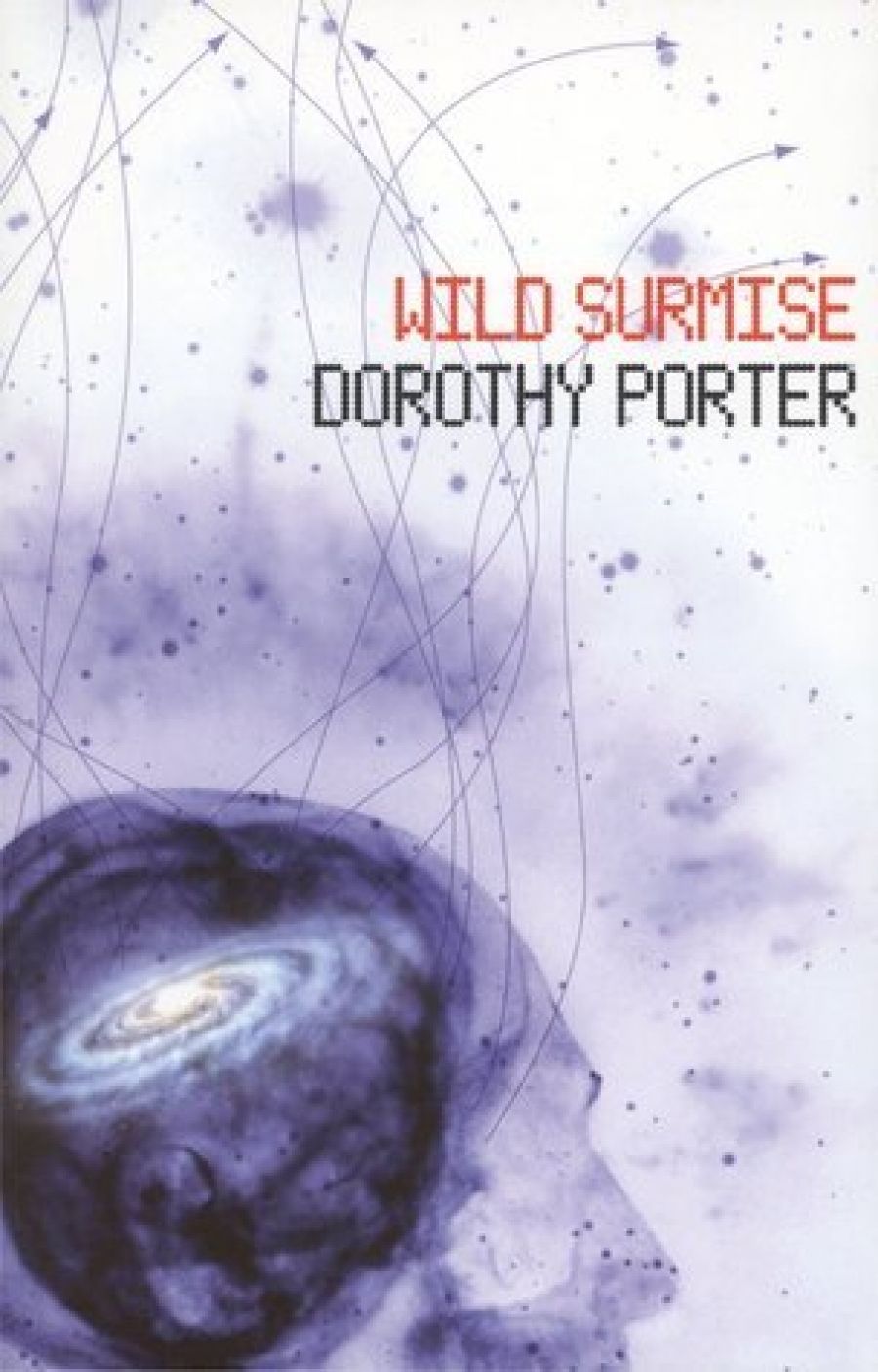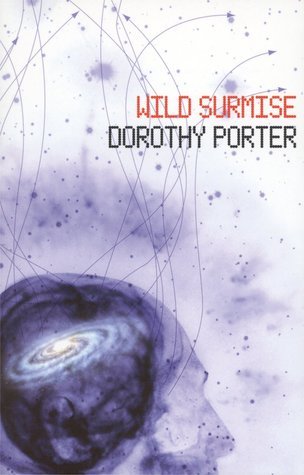
- Free Article: No
- Custom Article Title: Wild Surmise
- Review Article: Yes
- Article Title: Wild Surmise
- Online Only: No
- Custom Highlight Text:
Dorothy Porter’s new verse novel, Wild Surmise, takes an almost classic form. The verse novel is now well-established as a modern genre, and Porter has stamped a distinctive signature and voice on the verse form, particularly with the phenomenal success of her racy, action-packed detective novel, The Monkey’s Mask (1994). So it comes as no surprise to find this book setting a similarly cracking pace across some not entirely unexpected territory: an adulterous love affair between two women; and the death, through cancer, of a husband. Additional glamour and some thematic variation are provided by the women’s profession, astronomy. Both women are favourites on the lecture and television circuit, and Alex Leefson’s passionate interest in finding traces of biological life on Europa, one of Jupiter’s moons, generates some of the more purely lyrical moments.
- Book 1 Title: Wild Surmise
- Book 1 Biblio: Picador, $22 pb, 293 pp
- Book 1 Cover Small (400 x 600):

- Book 1 Cover (800 x 1200):

One of the hardest things to achieve in the verse novel is a balance or, at least, an accommodation between two powerful and often rival impulses: one towards narrative, the other towards lyric. In the main, Porter manages this potential contradiction well, though, if the page-turning quality of this novel is anything to go by, it is arguable that narrative wins out in the end: these are poems that tend to lead you on to the next one, rather than inviting slow, or considered, rereading. At what point does the husband realise his wife’s infidelity? And when does the wife realise her husband’s mortality?
Porter’s writing is fast and punchy, well-suited to the dramatisation of a dynamic and passionate love affair. Her lyrics are direct and powerful, though not completely immune from romantic cliché (‘my heart is exploding’) or a too easy melodrama (‘Alex’s mind rips and splits / like the ocean floor’). At her best, though, this directness takes a simpler, more reflective form. From ‘Radiation’: ‘when I flow to her / fast and shallow / like a channel / from a deep lagoon / frothing across to the sea // I have her intense attention. / It’s only afterwards / wearily driving home /I feel my skin / flake away / in a leprous snowfall …’
Like The Monkey’s Mask, but less obtrusively, Wild Surmise is concerned with poetry, and is even similarly, riskily, haunted by bad student poetry. Daniel is an embittered academic in a university English department whose course on Romantic Poetry has to be defended in terms of cost-effectiveness, while he spends hours assessing his students’ ‘stilted stories / and pretentious poems’. But when it comes to filtering and assessing his own life, he can still draw on his favourite resources - Dante, Marvell, Coleridge, Rilke, Dickinson and others - in a number of lively dialogues. In this way, Porter offers a series of variations on the traditional themes of the symposium of poets and the possibility of communing with the dead. Thus, it is Marvell for a walk to the lemon tree in the garden; Dante, and not Cavafy or Keats, for a trip to hospital. The poem ‘a green Thought in a green Shade’ is typical of Porter’s fearlessness in its self-conscious reprise of Marvell: ‘Is he right in arguing / with such lusciously lonely / metaphysical wit / that it’s best / to wander solitary? … The marvel of a ripening lemon / can’t be shared any better / than the bone-scratching terror / of cancer.’
I call this ‘fearless’ because of the poem’s insistence on naming its literary allusions (‘metaphysical wit’); its typically heavy alliteration (‘lusciously lonely’); its heavy-handed punning (the ‘marvel of a ripening lemon’). But, in the end, like many other poems in this collection, this one offers up its own understated yet chilling and distinctive metaphor (‘bone-scratching terror’).
I mentioned the ‘almost classic’ form of Wild Surmise, partly as an allusion to the sexual territory and the forceful style that are now distinctively associated with Porter. This new work is also instantly recognisable as a novel of adultery, though it’s not an Anna or an Emma who dies. Rather, it is the unhappy husband who perishes, with the result that, as the novel closes, the attention shifts away from the passions and disappointments of sexual love, towards the mystery of mortality.
At Daniel’s wake, his mother wonders: ‘Just what was he all about?’ Alex shows her into Daniel’s study, pointing to his ‘high-rise blocks / of lonely poetry tottering over them’. While the mother eventually recognises his love of poetry as her own legacy to her son - ‘he bloody well / got it from me’ - it’s interesting to speculate about the claims or concessions that Porter’s own poetry might be making. Does Wild Surmise itself constitute some kind of ‘lonely poetry’? On the other hand, Porter also shows us how to build our own ‘high-rise’ blocks, providing a bibliography (‘Daniel’s Poetry Reading List’) at the end of the volume.
So, in addition to the rival generic claims between narrative and lyric, and the rival emotional claims of husband and lover, Porter also dramatises the rival epistemological claims of poetry and science to explain the worlds we know and those we speculate about: the other worlds and the after worlds.
Even if subtlety is sometimes sacrificed to melodrama (perhaps especially where this ‘dazzling woman’, this ‘brilliant foreign lesbian’, the allegorically named astronomer Phoebe, is concerned), Porter’s novel offers a wonderfully varied sense of the things that poetry can do, encompassing dialogue, drama, meditation and passion. Ultimately, too, she demonstrates that poetry can both celebrate and command science.


Comments powered by CComment